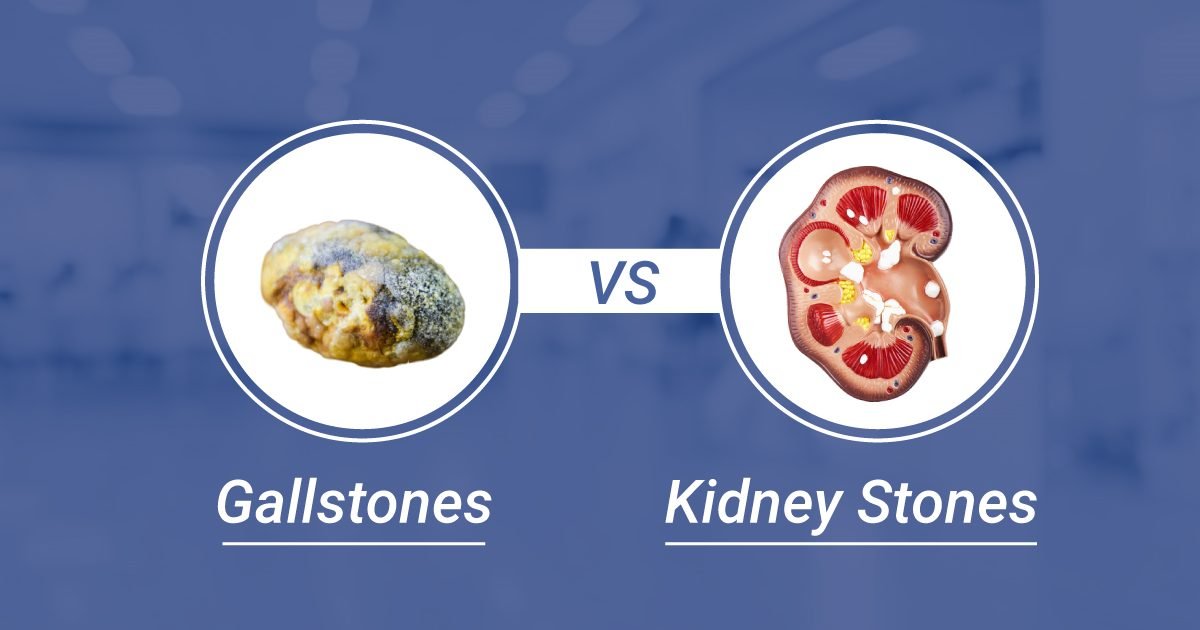Gallstones vs Kidney Stones: Introduction
Gallstones are as well as kidney stones two of the common health problems that can cause pain and discomfort. Despite sharing the same name as well as stone relation with them, they differ as they target different organs, and they have unique features. In this article, we will focus on the main features of both gallbladder stones vs kidney stones to clarify their causes, symptoms, types, and treatment methods.
Understanding Gallstones vs Kidney Stones:
Gallstones, as the name suggests, are stone-like substances that develop in the gallbladder, a small organ located under the liver. The gallbladder stores bile, a digestive compound made by the liver. Excess of cholesterol or bilirubin in the bile can cause the formation of gallstones. They come in different shapes and sizes from tiny stones to larger pebbles.
By contrast, kidney stones occur in the kidneys, the main organs that play a role in removing waste from blood and making urine. Kidney stones are solid deposits of minerals and salt that are formed in the kidneys. They can also differ in size, ranging from the size of a grain of sand to the size of a golf ball.
Causes of Gallstones vs Kidney Stones:
The causes of gallstones vs kidney stones are different, although the latter may also be associated with factors including diet, family history, and lifestyle.
Gallstones most often occur due to the weird ratio of certain substances, such as bilirubin, cholesterol, and bile acids that are in the bile. Factors such as obesity, losing weight rapidly, and a diet high in fats and cholesterol are all risk factors many people may not be aware of, but they can mean gallstone development is higher.
The kidney stone develops when urine has an excessive load of some substances such as calcium, oxalate, or uric acid. To illustrate this, dehydration, which is a habit of eating food having high oxalate and sodium contents as well as some medical diseases, are the most famous risk factors.
Symptoms of Gall Bladder Stone vs Kidney Stone:
Although gallstones and kidney stones affect different organs, they can cause similar symptoms, including:
- Severe abdominal pain: The most common part of the body, where gallstones impinge on, is the upper right abdomen. In the case of kidney stones, back, side, or lower abdomen area is the one where the pain prevails.
- Nausea and vomiting: Similarly, people also get nausea and frequent vomiting as side effects of this disease.
- Changes in urine: Stones in the kidneys can be detected in the urine mixed with blood (hematuria) or changes in urine colour. With the gallstones, the colour changes in stool and urine can be observed.
- Fever and chills: In such circumstances, there may be the presence of both gallstones and kidney stones that can lead to shivering and heat intolerance serving as evidence of infection and inflammation.
Types of Gallstones and Kidney Stones
Gallstones can be classified into two main gall bladder stone types: cholesterol stones and pigment stones as well. The most frequently encountered stones called cholesterol stones like deposits made of cholesterol. Pigment stones conversely refer to bilirubin calcium salts.
In another respect, stones in different variants occur due to the specificity of their composition. The most common types of kidney stones include: The most common types of kidney stones include:
- Calcium stones: This kind of kidney stone is the most common one of the kidney stone gall bladder stone types and is composed of calcium oxalate or calcium phosphate crystals.
- Struvite stones: Similarly, infection stones recognized as struvite stones, which are linked to urinary tract infections and comprising elements of magnesium, ammonium, and phosphate are also prevalent.
- Uric acid stones: These stones can be formed due to acute urine acidosis when it accumulates excess uric acid that is associated with a high-purine diet or certain urination disorders.
- Cystine stones: Cystinuria is one of the rarest kinds of stones that form due to hereditary disorders, which pathologically result in high levels of cystine production and excretion by the kidneys.
Treatment Options for Gallstones and Kidney Stones:
The treatment of stones that occur in gallstones vs kidney stones will depend on the size and type of the stone, severity of the symptoms and other health conditions. Treatment options may include:
- Watchful waiting: In certain instances, such as if the stones are small and they are not causing a problem then fate may be withheld until the condition gets worse.
- Medications: Certain medications aid in this process by breaking down these stones, so that it is easier for them to pass.
- Extracorporeal shock wave lithotripsy (ESWL): This non-invasive technique uses shocks to break the stones into smaller pieces, which will be excreted with urine.
- Surgical removal: In this case, lithotripsy (a non-invasive technique for breaking stones) can be done or, if stones are too large or causing complications, then the doctor may advise surgery to remove them. To make it possible for instance, gallstone gallbladder cholecystectomy will be performed, that is an operation for gallbladder removal.
- Lifestyle changes: Letting go of a bad diet, drinking lots of water, and including regular workouts in your routine can play a role in preventing both gallstone and kidney stone formation.
Gallstones vs Kidney Stones: Conclusion
To recap, gallstones vs kidney stones to some extent possess alike attributes; it is their precise locations and their one-of-a-kind features that make them however separate. The recognition of the distinctions between these two Gall bladder stone types of stones is very important because it lies with an accurate diagnosis and the performance of the appropriate treatment.
Suppose you are also seeking medical help for urological issues. In that case, you can contact and book an appointment with Dr.Saket Narnoli, who is known to be the Best Urologist in Dhanbad Providing Excellent Urological Services. With a tailored treatment plan and lifestyle modifications, Diabetes can usually be managed successfully.






